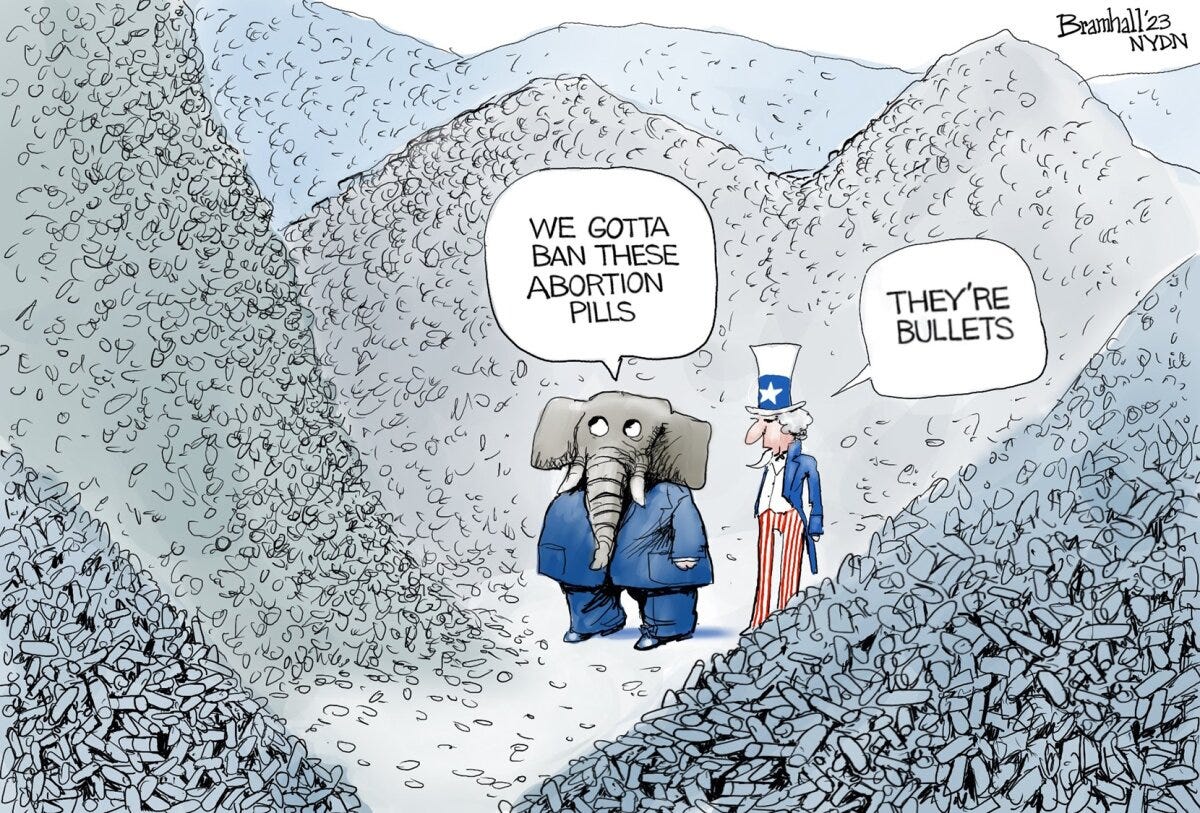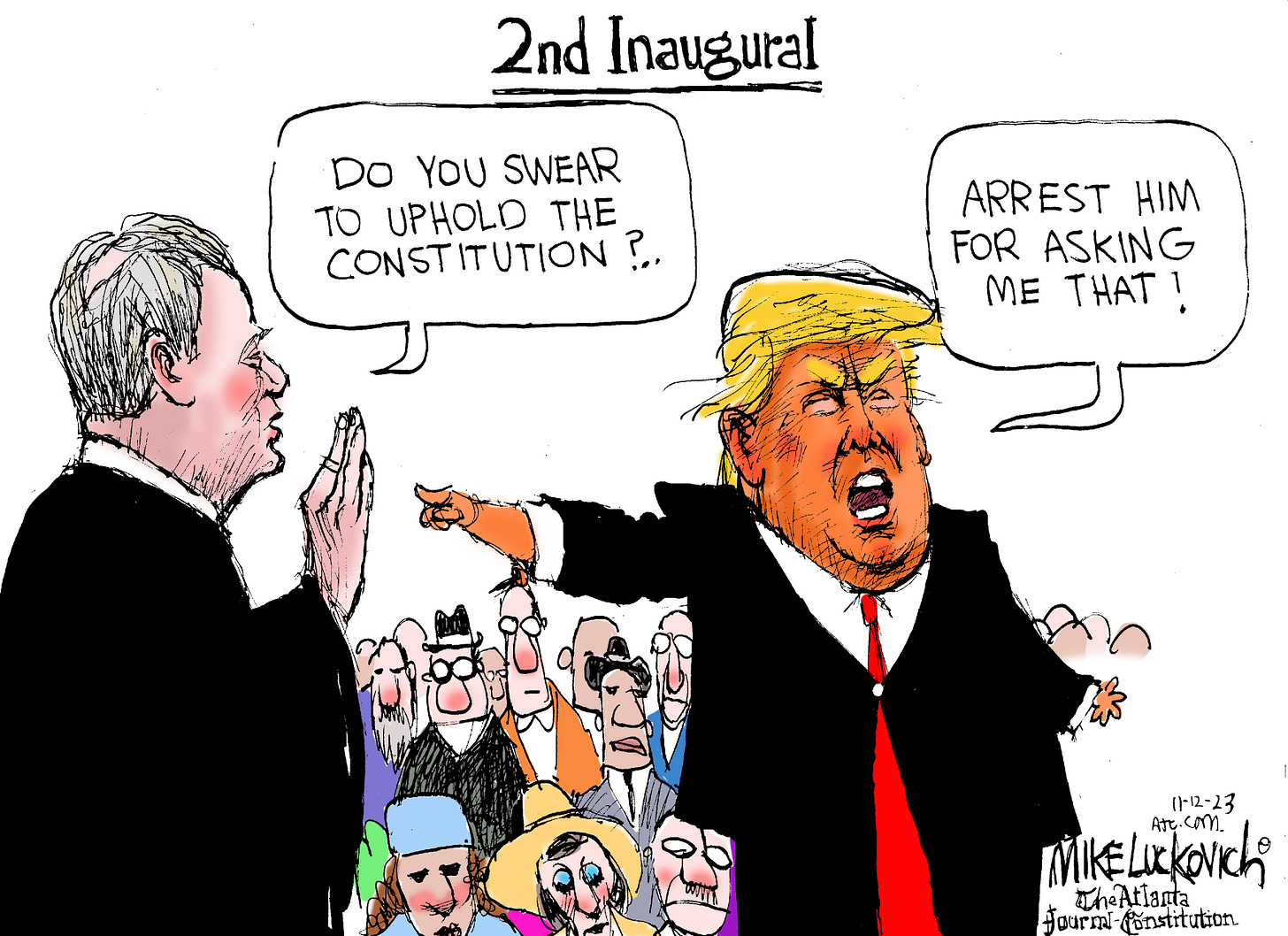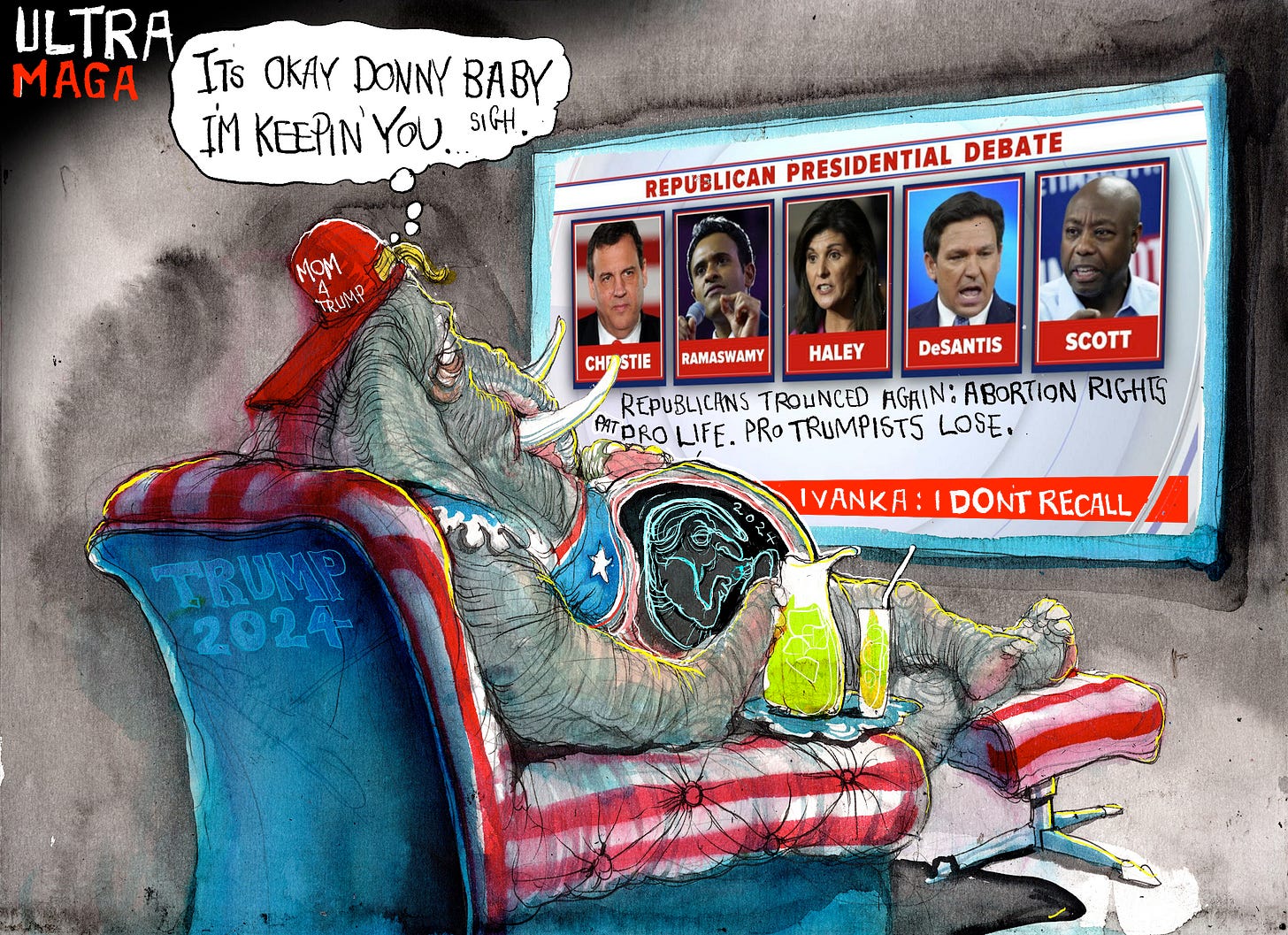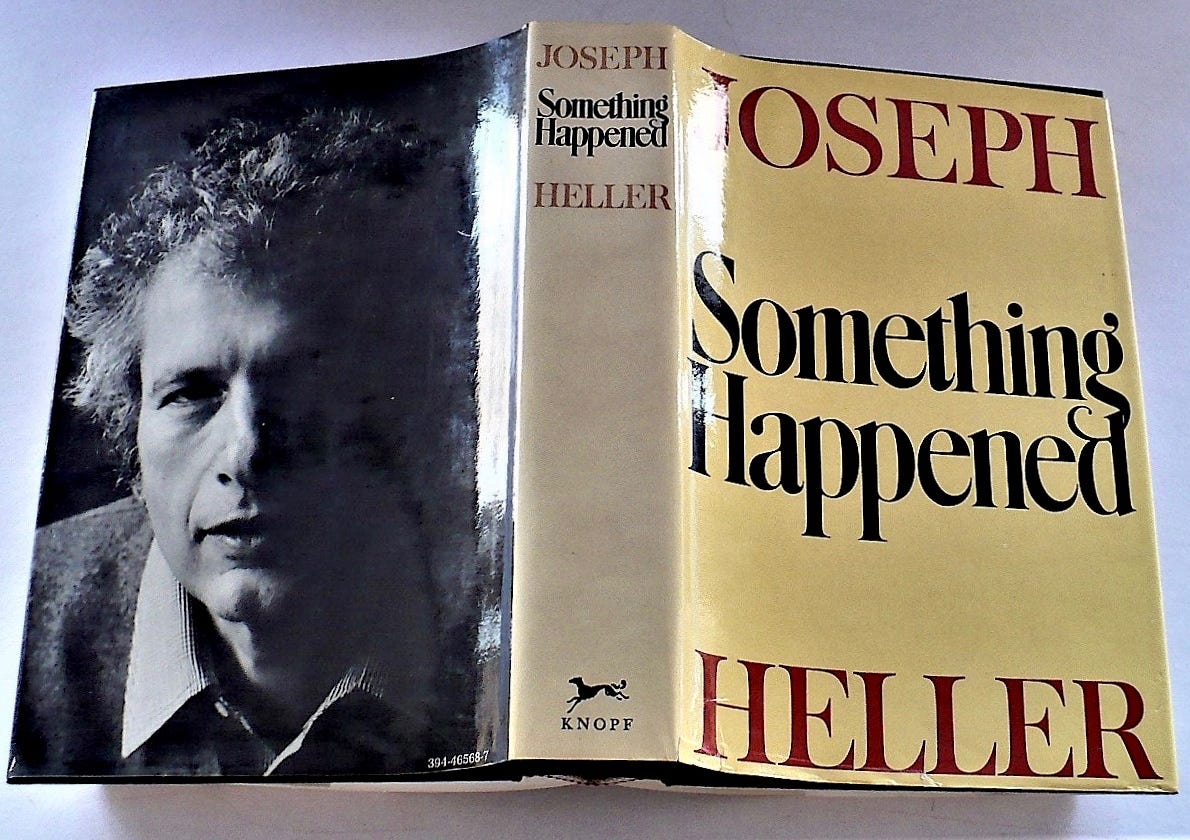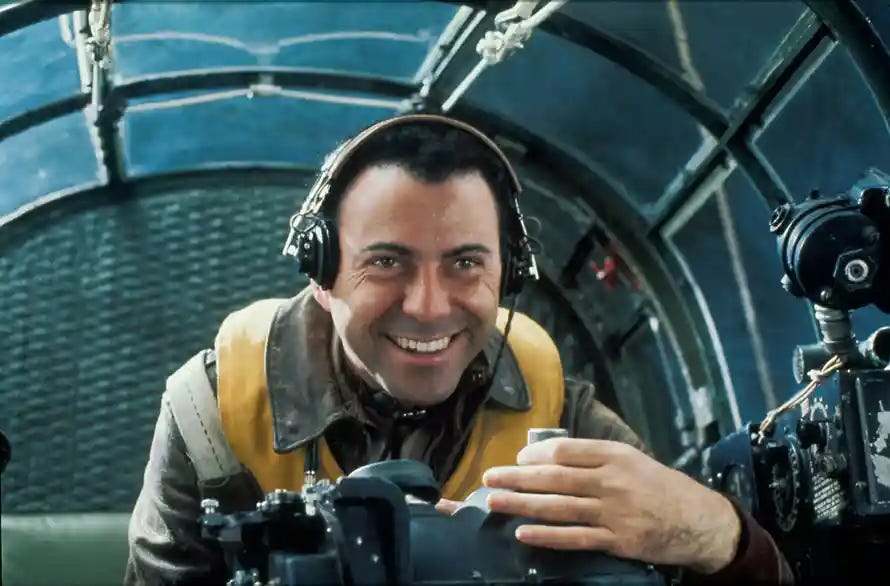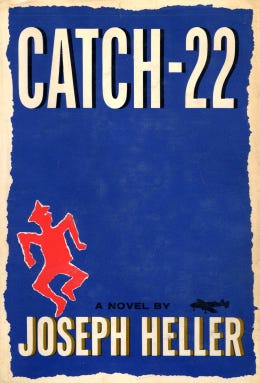Greg Mitchell is the author of a dozen books and now writer/director of award-winning films. He was the longtime executive editor of the legendary Crawdaddy. His newsletter remains FREE when you subscribe. His film “Atomic Cover-up” just debuted on PBS and you can watch here. And “Memorial Day Massacre: Workers Die, Film Buried" remains free on the PBS site. Both have companion books, which you can easily find at Amazon.
One of the great novels of our time, Catch-22, was published with little fanfare on this date in 1961. Critics and readers were slow to come around but when they did…a classic, especially for those of us growing up in the 1960s, emerged. So today I will look back to May, 1972, when I somehow secured a major and exclusive interview for Crawdaddy with one of my writing heroes, Joseph Heller, author of Catch-22 and (to that point) nothing after. Enjoy my fun tale below, then subscribe, it’s still free. Couple of political cartoons first…
To Heller and Back
Fifty-one years ago, I arranged for Crawdaddy an interview with the elusive author of my favorite novel at the time, Catch-22. It would be his first major interview in years and so extensive we had to run it in two issues of the magazine. More than once in my life back then I was told that I “write a beautiful letter,” so maybe that explains it.
Joseph Heller, more than a decade after his one classic, still had not produced a follow-up. No wonder I would open my eventual profile with a takeoff on a line from his masterpiece: “There was only one book…and it was Catch-22.”
Supposedly, a book titled Something Happened, set in a modern corporate office in New York, was nearly finished. Well, it had been “nearly finished” for quite some time. Heller told me he couldn’t change the title now even if he wanted to: “I’ve been talking about it for so long, if I changed it people would think it’s a different book.”
He predicted his millions of young/college fans—Catch-22 had sold six million copies and become a staple on required reading lists—would hate it. The central figure was a middle-aged white man, like Heller (no Yossarian), coping with racial issues, women’s lib, “the FBI, an inefficient government.” For good measure, he was working on a new production of his play, We Bombed in New Haven, and another based on Catch-22, which sounded like dithering actions to put off what was likely to be a mixed reaction to his new novel. Still, he professed having no interest in the theater. He did it just for the experience—much as he had written exactly one TV script, for McHale’s Navy.
Heller, 48, hadn’t been interviewed by anyone for years, but I talked to him at length in his office overlooking Central Park (where he liked to jog) and in a nearby French restaurant, for a provocative two-part Crawdaddy profile. At times the interview could have been called “Kvetch 22.” Heller complained, for example, that young people assumed he must do drugs, when all he’d ever tried was a little pot, which he did not care for, he assured me somewhat ruefully. He also had no interest in noisy rock music, although he owned a couple of Bob Dylan albums. Heller did appear youthful, however, with his long, curly, if greying hair.
He had just returned from speaking at Whittier College, Nixon’s alma mater, where students held an antiwar march in his, or maybe Yossarian’s, honor. But he argued that he favored more “disrespectful dissent,” such as occupying buildings, over “candlelight parades.” Unfortunately, the antiwar movement was petering out in mid-1972, partly because of the end of the draft. Like Yossarian, many had shifted to self-interest schemes.
So, naturally, much of our interviews contrasted World War II and Vietnam, where the U.S. air war was still going strong. Like Yossarian, he had been a young bombardier in the Good War—he flew 60 missions which left him, near the end, shaken and terrified. Today, he said, our Air Force crews were “being sent out on missions just to make their superiors, and those in Washington, look good.” There was no credible enemy, except plunging profits for certain industries if the war ended. In addition, there was an undeniable “sexual” component, of “having a big gun and being in a big plane and having bombs to drop.”
Catch-22, he testified, was not really about World War II but the Korean War and the Cold War “and looking ahead to the same type of unnecessary war which did come along and was the Vietnam War.” In any event, Catch-22 focused not on the hated Germans but “the conflict between people and their superiors. That’s the conflict we have today. I think the enemy we face today is not in Hanoi—the enemy is our own elected officials.”
Mike Nichols’ recent film of Catch-22, starring Alan Arkin—brilliantly cast as Yossarian—plus Orson Welles, Art Garfunkel and Jon Voight, had not exactly thrilled the critics or movie audiences but it did please Heller. It had a serious, even at times “vicious” edge, he pointed out, unlike the mainly comic “entertainment” that was Robert Altman’s MASH. Morethan four decades later, a much-hyped streaming series based on the book would also fall far short, the tone all wrong.
When he told me in 1972 that he hadn’t voted for twelve years, I tried out another line from Catch-22—“What if everyone felt that way?”--and wondered if he would respond with his own self-reference from that book. Sure enough, he came through with, “Then I’d be a damned fool to feel any other way, wouldn’t I?” And a big laugh. He did claim he would vote for peace candidate George McGovern vs. Nixon that November. (McGovern would lose every state except Massachusetts. Thanks, Joe.)
Heller, it turned out, was quite the raconteur, although some of his tales about drinking/dining friends such as Mario (“Godfather”) Puzo, Mel Brooks and others, were, tragically, declared off the record. But it looked like Joe was serious about finishing the new novel this time. When we arranged a photo shoot at his summer home in the Hamptons he posed for all the shots with his short-sleeve shirt unbuttoned to the navel. Ready to flirt with young female fans on an author’s tour or college teaching gig? That could motivate many an aging male author of that time.
Well, that new novel, Something Happened, did finally appear in 1974—thirteen years after Catch-22—and it did receive a mixed but largely very favorable reaction. (It was only after this that his writing began to falter.) He signed a first edition to me, “Best wishes, and with hopes it does not disappoint you.” We remained friends for awhile. He granted Crawdaddy rights for a major excerpt from Something Happened, and then allowed us to publish for the first time part of a play he’d written based on the hilarious “Clevinger’s Trial” chapter of Catch-22. He told his friend Kurt Vonnegut, Jr. about his enthusiasm for my profile. This led to my rather famous Vonnegut interview the following year (and later this book).
Heller even recommended my first novel (much of it written, as I noted here recently, at Bruce Springsteen’s house) to a couple of editors. There was only one catch….it was not quite good enough.
To mix authors a bit: So it goes.


